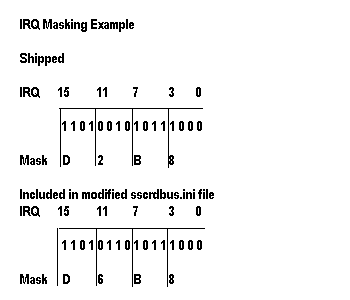

|
16.868 bytes |
Service Hints & Tips |
Document ID: LWIK-3XZFN6 |
TP 380XD,385XD,560X,600,770/E - CardWizard for Windows NT reports IRQ conflict when trying to use a PC Card at IRQ 10
Applicable to: World-Wide
SYMPTOM:
When using Windows NT 4.0 with SystemSoft CardWizard for NT version 3.10.x (as supplied by IBM), users may not be able to assign IRQ 10 to a PC Card even when the resource is free. Note that on some models of 600 and 770, the Secondary IRQ for the ACP modem defaults to IRQ 10. This tip is intended to address those situations where the system is not equipped with the ACP modem, or where the modem IRQ has been manually changed, to allow the use of IRQ 10.
Because Windows NT is not a Plug and Play aware operating system, it may not completely or correctly be able to determine hardware resources for peripheral devices, so a mask has been added to the CardWizard software to disallow the use of some IRQ values. Since the ACP Modem IRQ defaults to 10, this IRQ has been masked (disabled) from being used by PC Cards in the version supplied by IBM.
CONFIGURATION:
This tip applies to all 380/5X/XD, 560X, and non-ACP modem equipped models of 600 and 770 ThinkPads Running Windows NT 4.0. It may also apply to ACP equipped models when the ACP modem has been disabled, or moved to another IRQ.
SystemSoft CardWizard version 3.10.xx, as supplied by IBM. This may also apply to other versions of CardWizard for NT that may be purchased directly from SystemSoft. For information on IRQ Masking on a SystemSoft supplied version, please contact SystemSoft Corporation.
SOLUTION:
The IRQ mask is an entry in the Windows NT registry. IBM recommends against editing the Windows NT registry directly, since errors in the registry may make the system unusable, and require the reinstallation of the operating system. The default values for the IRQ mask are contained in an ini file on the CardWizard installation diskette. A modified copy of that file is included in this article. When the file is copied to the installation diskette, overwriting the file that came on the diskette, and CardWizard for Windows NT is reinstalled, the new values will be in place.
Fix Procedure
1) Download the Sscrdbus.ini file by clicking on the icon below.
2) Copy that file to the CardWizard for Windows NT installation diskette made from diskette factory or downloaded from the IBM Web Site. If prompted, confirm that you wish to overwrite the file on the diskette.
3) Uninstall CardWizard for Windows NT by using the Add/Remove Programs object in Control Panel.
4) Restart the system and Windows NT.
5) Re-install the CardWizard software from the diskette you have modified in step 2 above.
6) Restart the system, IRQ 10 should now be available for use by PC-Cards.
>> Modified Sscrdbus.ini file >>>>( )
)
ADDITIONAL INFORMATION:
More information on IRQ masking including the specific registry keys used is available on the SystemSoft Web Site at http://www.systemsoft.com under the technical support heading.
A quick primer on the attached file is included below:
In the following example, each 4 bit binary segment is resolved into a hexadecimal number. These numbers are what is changed in the Sscrdbus.ini file included in this article.
The binary values have the following meaning:
1=IRQ associated with this position is available (not masked) for use by PC Cards.
0=IRQ associated with this position is not available (masked) and will not be assigned to PC Cards.

In this example, if a user wished to make IRQ 11 available for PC Cards, (after moving the IRQ assigned to PCI devices) the new IRQ mask would be DEB8.
|
Search Keywords |
| |
|
Hint Category |
PCMCIA (PC Card), Windows NT | |
|
Date Created |
04-09-98 | |
|
Last Updated |
05-05-99 | |
|
Revision Date |
06-05-2000 | |
|
Brand |
IBM ThinkPad | |
|
Product Family |
ThinkPad 380XD, ThinkPad 385XD, ThinkPad 560X, ThinkPad 600, ThinkPad 770, ThinkPad 770E/ED, ThinkPad 380Z, ThinkPad 560Z, ThinkPad 770X, ThinkPad 600E, ThinkPad 770Z | |
|
Machine Type |
2645, 9548, 9549, 2635, 2640, 2636, 2641, 2646, 9544 | |
|
Model |
All | |
|
TypeModel |
| |
|
Retain Tip (if applicable) |
| |
|
Reverse Doclinks |